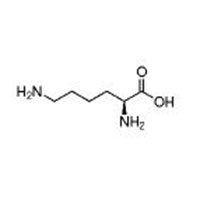



| N/A |
| Packing | |
|---|---|
| Storage | Powder -20°C 3 years 4°C 2 years;In solvent -80°C 6 months, -20°C 1 month |
| Shipping | Room temperature in continental US; may vary elsewhere |
Tel: 0086-25-52397805
Email: info@alchemist-chem.com

| Common Names | L-Lysine base | ||
|---|---|---|---|
| Structure |  |
||
| CAS No. | 56-87-1 | Boiling Point (℃) | 311.5±32.0 °C at 760 mmHg |
| Molecular Weight | 146.188 | Melting Point (℃) | 215 °C (dec.)(lit.) |
| Density | 1.1±0.1 g/cm3 | Vapor Specific Gravity | N/A |
| Molecular Formula | C6H14N2O2 | Flash Point (℃) | 142.2±25.1 °C |
| Solubility | H2O: 0.1 g/mL, clear, colorless | Autoignition Temperature (℃) | N/A |
| Personal Protective Equipment | Eyeshields;Gloves;type N95 (US);type P1 (EN143) respirator filter | ||
|---|---|---|---|
| Hazard Codes | T+:Very toxic | ||
| Safety Phrases | S1-S28-S45 | ||
| RIDADR | NONH for all modes of transport | ||
| WGK Germany | 3 | ||
| SYMPTOMS | PREVENTION | FIRST AID | |
| Inhalation | Cough. Sore throat. | Use local exhaust or breathing protection. | Fresh air, rest. |
| Skin | Redness. Burning sensation. Itching. | Protective gloves. | Remove contaminated clothes. Rinse and then wash skin with water and soap. |
| Eyes | Redness. Pain. | Wear safety goggles. | First rinse with plenty of water for several minutes (remove contact lenses if easily possible), then refer for medical attention. |
| Ingestion | Abdominal pain. Nausea. Vomiting. | Do not eat, drink, or smoke during work. Wash hands before eating. | Rinse mouth. Induce vomiting (ONLY IN CONSCIOUS PERSONS!). Refer for medical attention. |
| Description | L-lysine is an essential amino acid[1][2] with important roles in connective tissues and carnitine synthesis, energy production, growth in children, and maintenance of immune functions[2]. | ||
|---|---|---|---|
| Target | L-lysine (150 mg/kg) promotes, but not initiates, bladder cancer. The administration of L-lysine to rats submitted to colovesical cystoplasty accelerates the development of transitional metaplasia of the intestinal epithelium[1]. L-lysine (10 mg/kg) treatment attenuates pancreatic tissue injury induced by L-arginine by inhibiting the release of the inflammatory cytokine IL-6 and enhance antioxidant activity[2]. | ||
| In Vitro | DL-Lysine (Lys) is a high affinity, basic amino acid substrate for amino acid transporter b0,+ with Km value ranging from 100-400 μM[1]. | ||
| References | [1]. Santos AMD, et al. Transitional metaplasia in intestinal epithelium of rats submitted
to intestinal cystoplasty and treatment with L -lysine. Acta Cir Bras. 2017
Apr;32(4):297-306. [2]. Al-Malki AL. Suppression of acute pancreatitis by L-lysine in mice. BMC Complement Altern Med. 2015 Jun 23;15:193. |
||